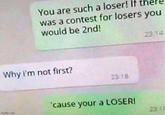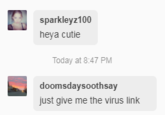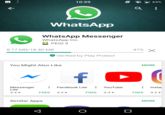Confirmed 36,444
Part of a series on Facebook / Meta. [View Related Entries]
Part of a series on Facebook / Meta. [View Related Entries]
[View Related Sub-entries]
| Navigation |
| About • History • Features • Highlights • Related Memes • Momo • Search Interest • External References • Recent Images |
About
Whatsapp is a carrier-free messaging app that allows phone-to-phone messaging over the Internet, creating a free method for text-message style communication internationally. The app, which is owned by Facebook, is the biggest messaging app in the world, with over 900 million users as of September 2015.
History
Founded in 2009 by two ex-Yahoo employees, WhatsApp was originally created as a status-showing app, and named due to its linguistic similarity to "What's Up?".[3] When Apple released push notifications for the iPhone in June 2009, WhatsApp enabled them for status changes, and introduced a messaging feature; within a few months more than 250,000 people had downloaded the app.[1] Later that year, after receiving a seed investment, WhatsApp introduced a version for Blackberry, which allowed Blackberry users and iPhone users to communicate for free via messaging internationally.
The company switched from a free structure to a $0.99/year plan to keep the system from growing too fast. By 2011, WhatsApp was usually found in the top 20 apps list in the iPhone app store. By February 2013, the app had more than 200 million users, and it had doubled that number by the end of 2013; as of September 2015, the app has over 900 million users.[1] It is most popular in India, where it has over 65 million users, but people worldwide use it on both Android and Apple phones. In 2014, the company was acquired by Facebook for $19 billion. Many users disagreed with the acquisition, and moved their messaging to competing services like Line and Telegram after a service outage.[4]
Features
WhatsApp allows anyone with the app to message anyone else with the app, which is common in messaging, but it also allows people with the app to message anyone with a cell phone number as well, but using the smartphone's wifi connection instead of its cell connection. This innovation freed the phone from international data and text-messaging fees, and made it easier for people to communicate by text messaging to their friends and family in other countries.[5]


In November 2014, WhatsApp introduced a feature called "Read Receipts," which showed other user if their message had been seen or not, but the feature annoyed many and they introduced a method of disabling it a week later.[6] In January 2015, WhatsApp introduced VoIP calling, allowing people to use the app to make phone calls to people in other countries for a lower rate.
Highlights
"Los Mensajes del WhatsApp"
In January 2014, Mexican singer Cartel de Santa released a single called "Los Mensajes del WhatsApp," which gained popularity in Spanish-Speaking cultures worldwide.[7] As of January 2016, the video has almost 42 million views.
Jo Baka
Jo Baka (જો બકા) is an Indian phrase which roughly translates to “So, my friend”. The phrase, typically associated with the Indian state Gujarat, reached nationwide popularity in 2014 due to a series of image macros distributed via WhatsApp.
Malicious WhatsApp Clone
On November 3rd, 2017, Redditor [8] E_x_Lnc posted on the /r/Android subreddit a series of screenshots revealing two different WhatsApp apps being sold in the Android store. The images show the original "WhatsApp Messenger" app (shown below, left) and the fraudulent "Update WhatsApp Messenger." Within a week, the post received more than 600 points (91% upvoted) and 130 comments.


Later that day, another Redditor[9] megared17 explained that that extra bytes, which "are a unicode space at the end," allowed the app to be registered under the name "WhatsApp Inc." Essentially, the makers of the fake app added several spaces at the end of the publisher name, "WhatsApp Inc."


Another Redditor,[10] dextersgenius, responded to megared17 stating that the app is "an ad-loaded wrapper which has some code to download a second apk, also called 'whatsapp.apk.'" The "Update WhatsApp Messenger" installs ads and other software without the user's knowledge.
As of November 6th, the "Update WhatsApp Messenger" app has been downloaded more than one million times. Several news outlets covered the story, including BBC,[11] Mashable,[12] The Daily Dot[13] and more.
Related Memes
Momo
Momo is a nickname given to a sculpture of a young woman with long black hair, large bulging eyes, a wide smile and bird legs. Pictures of the sculpture are associated with an urban legend involving a WhatsApp phone number that messages disturbing photographs to those that attempt to contact it, linked to a game referred to as the "Momo Challenge" or "Momo Game." Similar to the Blue Whale Challenge, many have accused the suicide game of being a hoax.
Search Interest
External References
[2] iTunes App Store – WhatsApp
[3] Forbes Tech – Exclusive: The Rags-To-Riches Tale Of How Jan Koum Built WhatsApp Into Facebook's New $19 Billion Baby
[4] Tech Crunch – Mobile Messaging App Line Claims 2M New Users In 24-Hour Period After WhatsApp Outage
[5] Laptop Mag – How to Get Started with WhatsApp
[6] Stuff – 21 secret WhatsApp tricks you (probably) didn't know about
[7] Remezcla – Cartel de Santa's Unfortunately Catchy Viral Video: 'Los Mensajes del Whatsapp'
[8] Reddit – PSA: Two Different Developers, under the SAME NAME.
[9] Reddit – megared17's Post
[10] Reddit – dextersgenius' Post
[11] BBC – Fake WhatsApp app downloaded more than one million times
[12] Mashable – This fake WhatsApp app has been downloaded more than a million times
[13] The Daily Dot – Malicious WhatsApp clone was downloaded more than 1 million times
Recent Videos
There are no videos currently available.
Recent Images 15 total
Share Pin
Related Entries 59 total
Sub-entries 5 total
Recent Images 15 total
Recent Videos 0 total
There are no recent videos.














Comments ( 14 )
Sorry, but you must activate your account to post a comment.
Please check your email for your activation code.